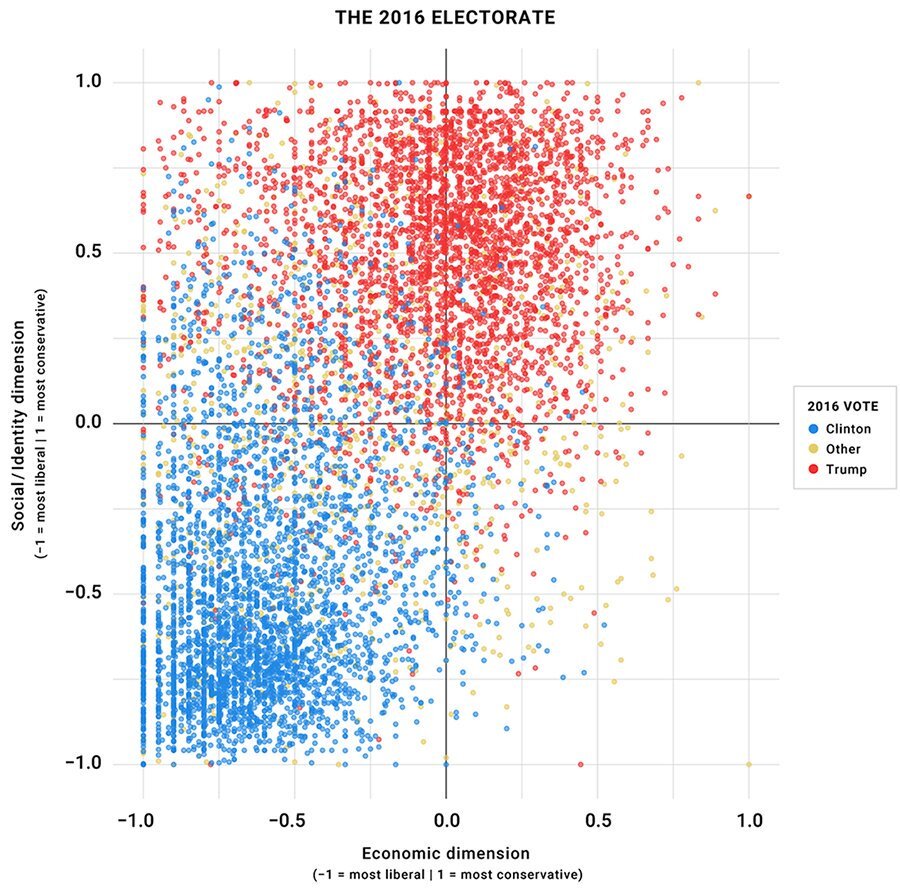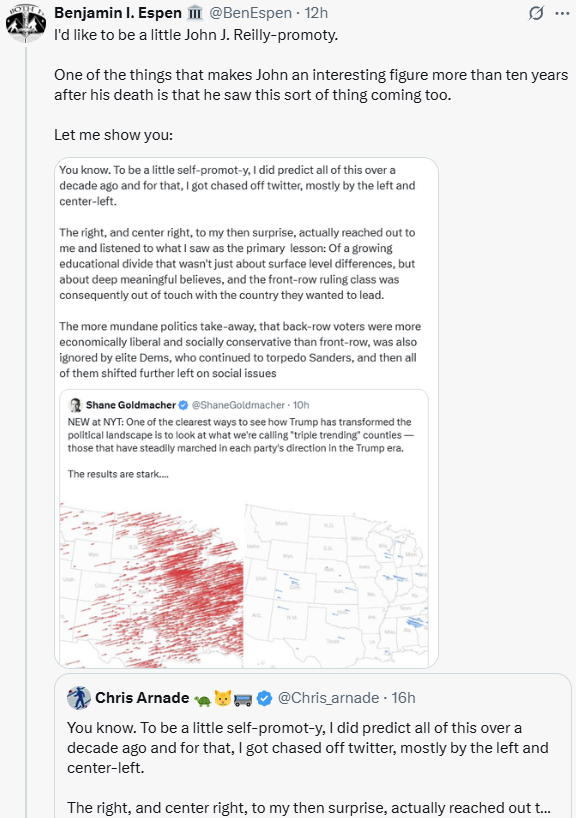The Long View 2007-06-18: Third Party Platform; War without End; Disillusionment & Global Warming

John J. Reilly recommended that any third party or attempted realignment of American politics attempt to recreate something of the New Deal, which matches up pretty well with this chart from 2016. What goes by the name populism is often an attempt to move a nation’s politics toward the upper left quadrant in this chart.
Third Party Platform; War without End; Disillusionment & Global Warming
Since the Republican Party has a death wish, Instapundit asks what a third major US political party should stand for:
The political press can run with stories about bloggers being in full revolt over immigration, but it's not really a case of bloggers vs. the Administration. Rather, it's a case -- like Harriet Miers, Dubai Ports, PorkBusters, etc. -- of the Bush Administration ignoring the clear warnings available in the blogosphere. And once again, it's not just bloggers who think the Administration is crazy. So far, every time they've done that they've had their head handed to them. That'll happen this time, too, and if they should happen to "win" and pass their bill, the consequences for the GOP will be even worse. "Bizarre Republican Death Wish?" Indeed.
Frankly, that's okay with me. I've long been unhappy with both Democrats and Republicans. The GOP has been better on national security, though that advantage is fading with time, but overall both parties have been lame and more likely to unite in opposition to citizens' rights and liberties than to compete in protecting them. I've often at least sort-of hoped for a third party that would combine the GOP economic-libertarian strands with the Dems' social-libertarian strands. I don't know if the GOP's self-destruction makes that more likely, but it seems like it might. At any rate, if people really want to commit suicide it's hard to stop them, and that seems to be the GOP's main goal at the moment.
This model for a new party is anachronistic. The problem with both parties is that they show increasingly little interest in maintaining basic public order. The failure to address the weird transformation of medicine into a luxury industry is one example of that; the indifference to the effects of perpetual high immigration is another. The mix of economic-libertarian with social-libertarian that Instapundit proposes is both bad policy and bad politics. Social libertarianism is a Darwin Award Winner and so is not a serious possibility. Societies and sections of societies that live like that simply do not sustain themselves demographically. Economic libertarianism has to be a feature of any workable economic system, but it's a feature that must be de-emphasized during times of collective peril. When public risk increases, as from catastrophic economic downturns or from existential war, then personal risk must be shifted to public institutions. Otherwise, the public cannot be mobilized to support the measures necessary to confront the public peril.
As I have remarked before, and will certainly remark again, this risk shift was key to mobilizing the publics of the Western world during the era of great wars from 1860 to 1945. It is the opposite of what George Bush has done; it is the explanation for why he has no cushion of support based on domestic issues to sustain him over rough spots in the conduct of his foreign policy.
A useful third party would be very ill-advised to try to revive the Great Society. That was a project that aimed at social transformation through social work given the force of law. A third party would prosper if it adopted aspects of the New Deal, an essentially conservative enterprise that, for instance, made the promotion of the nuclear family the chief priority of social policy.
The way of American history is that third parties become demonstration projects for policies and ideas that the other parties adopt. This time around, maybe a third party could become a national electoral force; the disintermediation of news media makes that at least conceivable. Even so, the party would be less a matter of new faces than of prominent politicians and some important institutions deserting to the new coalition.
* * *
We've Lost. Here's How To Handle It, is the title of a "you won't feel a thing" piece on Iraq by Steven Simon and Ray Takeyh in The Washington Post:
But the most crucial reason why the war is lost is that the American people decisively rejected continuing U.S. military involvement last November. As far as the voters are concerned, the kitchen is closed. U.S. policymakers have not yet faced this hard fact. Some disasters are irretrievable, and this is one of them. Unless we admit that, we cannot begin the grueling work of salvage.
I think perhaps that the hard fact that American policymakers have to face is that it is not in the power of the United States to end the war, not even with respect to American casualties. That simply has not been our experience with the Middle East over the last 30 years. Every retreat, even every attempted surrender, results in bigger explosions and more devastating attacks.
* * *
The government can control the weather, but it can't seal the borders? Mark Steyn presents us with this paradox:
The same people who say that government is a mighty power for good that can extinguish every cigarette butt and detoxify every cheeseburger and even change the very climate of the planet back to some Edenic state so that the water that falleth from the heaventh will land as ice and snow, and polar bears on distant continents will frolic as they did in days of yore, the very same people say: Building a border fence? Enforcing deportation orders? Can't be done, old boy. You're dreaming. Cloud-cuckoo stuff. Pie-in-the-sky.
As readers will recall, I am inclined to think that most of the recent climate change is anthropogenic, but I also think that there is about a 40% chance that it is all or mostly due to solar activity (perhaps but not necessarily connected with the expansion of the solar magnetosphere). Judging by sunspot counts, the sun has been acting oddly for the past 40 or 50 years. This could stop. It would cause grave embarrassment if it did.
Some thought should be given to the consequences of the disconfirmation in five or ten years of the anthropogenic climate-change hypothesis. Henry Farlie once remarked that no institution came through the 1960s with its integrity intact. We could experience a comparable disillusionment, this time with the scientific and public policy establishments as the victims.
It is difficult not to enjoy the sight of the Wise and Good with egg on their face. Nonetheless, it is a bad thing when a necessary public institution is discredited. We need science. We also need its practitioners to be believable.
Copyright © 2007 by John J. Reilly
Support the Long View re-posting project by downloading Brave browser. With Both Hands is a verified Brave publisher, you can leave me a tip too!



Comments ()